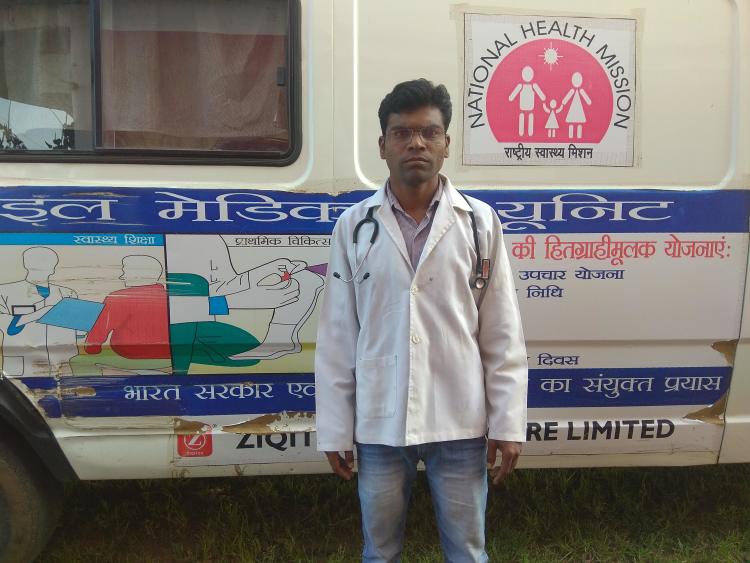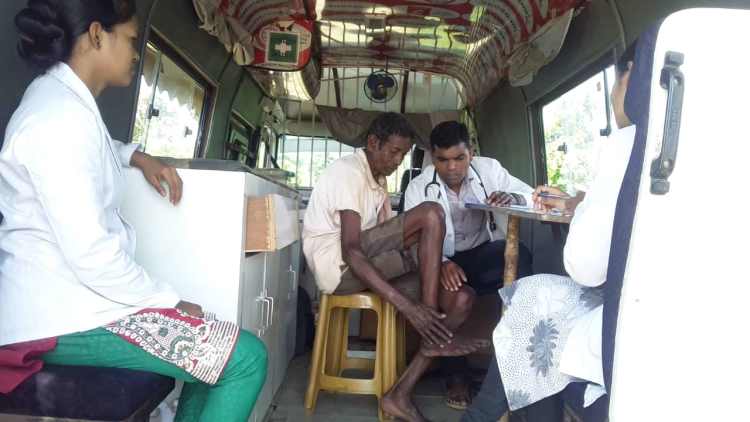Equal, affordable and quality health service is still a distant dream for the people of India. Madhya Pradesh is considered as one of the poorest states as far as the health scenario of the state is concerned. Infant mortality rate is 47 which is the highest among all Indian states, the maternal mortality rate is 173 which is also very high. Immunization programme reaches only 50.02% in rural areas of MP in 2016. The health index released by the National Institution for Transforming India (NITI) Aayog placed Madhya Pradesh at 17th position among 21 larger states.
Being part of Milaap Fellowship programme allows me to travel to very remote places of Mandla, Dindori and Jabalpur district in the last couple of months. I have observed that hospitals and other health services are not easily accessible for the people. It signifies less attention has been given to the rural health services.
The lack of health services preventing people from attaining social justice. It is not my intention to criticize the government since there are a few good steps taken by the government to provide health services but it is still inadequate to be accessible for all.

Dr Lalit Gohe with the medical van
During my field visit, I have met Dr Lalit Gohe who is the in-charge of Deen Dayal Chalit Aspatal (Mobile Medical) of Niwas unit. Deen Dayal mobile medical unit programme was launched by the Public and Family Welfare Department of Madhya Pradesh state government in 2006. It has started mainly because of the government’s realization that health service is not accessible to all people of the state. The goal of the programme is to improve the availability of quality health service, especially in tribal areas. Dr Lalit Gohe visits different villages of Niwas development block in a medical van equipped with the nurse, a lab technician, a driver, necessary appliance and medicines. He provides treatment to the patient of remote areas, forest and tribal villages. Medicines are also distributed at free of cost. He treats more than 60 patients every day.

Dr Lalit Gohe treating a patient inside the medical van
He has mentioned that the health condition of the people residing in those remote areas is pathetic. Most of the people are illiterate and living under below the poverty line. The awareness of self-care, hygiene and medical services are very less among them. Moreover, due to poverty, they can not afford quality health facility which is already hard to access. Mobile medical is a welfare-oriented approach by the government to provide quality health service to the people but still, health service is not available for all. The medical van visits only a few villages in a day but there are lots of villages with no health service available. People can't wait for mobile medical to come to their village during their illness.
The urban areas are equipped with quality and accessible health infrastructure but our country is failing to do so in rural areas. The public spending is just over 1% of the GDP which causes a slow growth of the public health sector. Private healthcare service is very much focused on urban areas and it is too expensive for the people living under the poverty line. Deen Dayal Chalit Aspatal is a relief for the people of rural areas of Madhya Pradesh. But it can not be a permanent solution. High quality, affordable, accountable and accessible health infrastructure should be established in rural and backward places. It will be a step forward towards the social justice.
Reference: niti.gov.in
9th February 2018- https://timesofindia.indiatimes.com/city/bhopal/niti-aayog-health-index-ranks-mp-at-17-among-larger-states
Being part of Milaap Fellowship programme allows me to travel to very remote places of Mandla, Dindori and Jabalpur district in the last couple of months. I have observed that hospitals and other health services are not easily accessible for the people. It signifies less attention has been given to the rural health services.
The lack of health services preventing people from attaining social justice. It is not my intention to criticize the government since there are a few good steps taken by the government to provide health services but it is still inadequate to be accessible for all.

Dr Lalit Gohe with the medical van
During my field visit, I have met Dr Lalit Gohe who is the in-charge of Deen Dayal Chalit Aspatal (Mobile Medical) of Niwas unit. Deen Dayal mobile medical unit programme was launched by the Public and Family Welfare Department of Madhya Pradesh state government in 2006. It has started mainly because of the government’s realization that health service is not accessible to all people of the state. The goal of the programme is to improve the availability of quality health service, especially in tribal areas. Dr Lalit Gohe visits different villages of Niwas development block in a medical van equipped with the nurse, a lab technician, a driver, necessary appliance and medicines. He provides treatment to the patient of remote areas, forest and tribal villages. Medicines are also distributed at free of cost. He treats more than 60 patients every day.

Dr Lalit Gohe treating a patient inside the medical van
He has mentioned that the health condition of the people residing in those remote areas is pathetic. Most of the people are illiterate and living under below the poverty line. The awareness of self-care, hygiene and medical services are very less among them. Moreover, due to poverty, they can not afford quality health facility which is already hard to access. Mobile medical is a welfare-oriented approach by the government to provide quality health service to the people but still, health service is not available for all. The medical van visits only a few villages in a day but there are lots of villages with no health service available. People can't wait for mobile medical to come to their village during their illness.
The urban areas are equipped with quality and accessible health infrastructure but our country is failing to do so in rural areas. The public spending is just over 1% of the GDP which causes a slow growth of the public health sector. Private healthcare service is very much focused on urban areas and it is too expensive for the people living under the poverty line. Deen Dayal Chalit Aspatal is a relief for the people of rural areas of Madhya Pradesh. But it can not be a permanent solution. High quality, affordable, accountable and accessible health infrastructure should be established in rural and backward places. It will be a step forward towards the social justice.
Reference: niti.gov.in
9th February 2018- https://timesofindia.indiatimes.com/city/bhopal/niti-aayog-health-index-ranks-mp-at-17-among-larger-states








